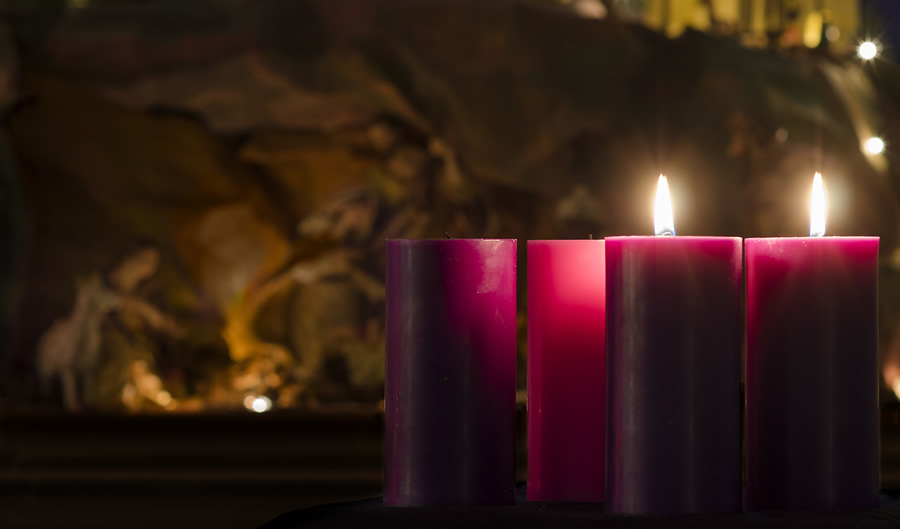
Second Week of Advent
12-08-2019Weekly ReflectionFr. Will SchmidIn 1972, after a very interesting decade in the 20th century, a young German priest, theologian, and University professor by the name of Fr. Joseph Ratzinger was asked to write an essay answering the question, “Why I am Still in the Church.” In his essay he used the image of the moon to explain his response to the question.
The moon, as the young Fr. Ratzinger explained, represents the world of men, the earthly world, the world that receives its identity and fruitfulness from somewhere else: from the sun. The light of the moon is borrowed light. It’s light is not its own, but rather the light of another.
When we think of the moon, we think of the bright shining celestial body that lights up the sky and expels the darkness of the night. Because of the reflective light of the moon, we possess sight and thus, direction in the midst of dark times.
Yet, when we have sent various voyagers and probes to the moon, we have discovered that the moon is anything but the bright celestial body that we perceive it to be. In fact, the moon is actually a desolate place. It is composed of stone, desert, sand, and mountains. It is a dark and lifeless place. And yet, when we think of the moon, we do not think of its rough landscape. Rather, we think of the reflective light of the sun. In a way, we could say that the moon is what it is not, and is not what it is. In other words, it’s true identity is not found in what it is composed of, but in what it belongs to: the sun. The moon may consist of dark and rocky terrain, but it’s true identity is the bright shining reflective light of the sun.
Fr. Ratzinger went on to say that this image of the moon expresses the ultimate reason why he remains in the Church: because the Church is not ours, but God’s. Although the human beings who make up the Church are very much imperfect and broken, she still belongs to the Lord, and even through her brokenness, she brilliantly reflects the light of the Son of God, Jesus Christ upon the world.
St. Bernard of Clairvaux, a 12th century monk, gave a beautiful Advent homily where he mentioned three different comings of Jesus Christ that the Advent season prepares us for: the coming of Jesus Christ at Christmas, at the end of the world, and at the present moment. The letter to the Hebrews says, “Jesus Christ is the same yesterday, today, and forever.” He came in the past, He will come in the future, and He desires to enter more deeply into our lives today. As we prepare for all three of these comings of Jesus, the Church invites us to turn to John the Baptist for inspiration. As we all know, John the Baptist was an interesting character. He wore camel’s hair for clothing, he consumed locusts and wild honey as food, he made the barren desert his home, and he proclaimed a sharp message of repentance. From a worldly perspective, he was anything but pleasant or attractive. Yet, people from all over Judea came to hear him preach, repent of their sins, and recommit their lives to God. His message and his life was ordered toward the glory of the coming of the Messiah.
In a way, you could say that John the Baptist was like the moon. The camel’s hair, locusts and wild honey, barren desert, and powerful message of repentance was like the dark, rocky and desert terrain of the moon. The light that was shown through his life and mission was clearly not his own, but the light of the Lord. It was not his personal charisma or persuasive arguments that won people over to God. It was the holiness of his life and his unyielding obedience to the will of God that reflected the light of Christ, like a full moon reflecting the light of the sun. Everything he said and did gave powerful witness to the glory of the Lord, because every word and action was consecrated for Him.
As we prepare for the three comings of Jesus, we are invited to ask ourselves, how am I like John the Baptist? How am I like the moon? In other words, what areas of my life give beautiful witness to Jesus Christ? What areas in my life are failing to reflect the light of the Lord? Does every aspect of my life belong to God, or is there something within me that I must let go of, or change, so that it can more brilliantly reflect the light of Jesus Christ?
These are the important questions that our Lord wants us to wrestle with during this Advent season, so that we, like John the Baptist, might prepare the way of the Lord and make straight His paths, so that all can see the salvation promised to us by our good and merciful God.
BACK TO LIST